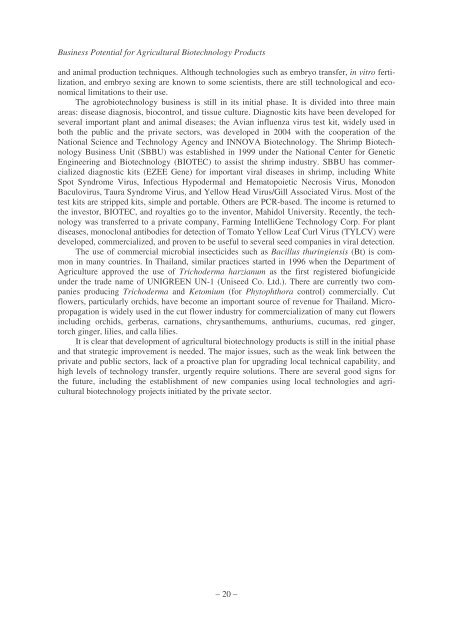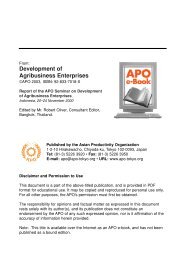Business Potential for Agricultural Biotechnology - Asian Productivity ...
Business Potential for Agricultural Biotechnology - Asian Productivity ...
Business Potential for Agricultural Biotechnology - Asian Productivity ...
Create successful ePaper yourself
Turn your PDF publications into a flip-book with our unique Google optimized e-Paper software.
<strong>Business</strong> <strong>Potential</strong> <strong>for</strong> <strong>Agricultural</strong> <strong>Biotechnology</strong> Products<br />
and animal production techniques. Although technologies such as embryo transfer, in vitro fertilization,<br />
and embryo sexing are known to some scientists, there are still technological and economical<br />
limitations to their use.<br />
The agrobiotechnology business is still in its initial phase. It is divided into three main<br />
areas: disease diagnosis, biocontrol, and tissue culture. Diagnostic kits have been developed <strong>for</strong><br />
several important plant and animal diseases; the Avian influenza virus test kit, widely used in<br />
both the public and the private sectors, was developed in 2004 with the cooperation of the<br />
National Science and Technology Agency and INNOVA <strong>Biotechnology</strong>. The Shrimp <strong>Biotechnology</strong><br />
<strong>Business</strong> Unit (SBBU) was established in 1999 under the National Center <strong>for</strong> Genetic<br />
Engineering and <strong>Biotechnology</strong> (BIOTEC) to assist the shrimp industry. SBBU has commercialized<br />
diagnostic kits (EZEE Gene) <strong>for</strong> important viral diseases in shrimp, including White<br />
Spot Syndrome Virus, Infectious Hypodermal and Hematopoietic Necrosis Virus, Monodon<br />
Baculovirus, Taura Syndrome Virus, and Yellow Head Virus/Gill Associated Virus. Most of the<br />
test kits are stripped kits, simple and portable. Others are PCR-based. The income is returned to<br />
the investor, BIOTEC, and royalties go to the inventor, Mahidol University. Recently, the technology<br />
was transferred to a private company, Farming IntelliGene Technology Corp. For plant<br />
diseases, monoclonal antibodies <strong>for</strong> detection of Tomato Yellow Leaf Curl Virus (TYLCV) were<br />
developed, commercialized, and proven to be useful to several seed companies in viral detection.<br />
The use of commercial microbial insecticides such as Bacillus thuringiensis (Bt) is common<br />
in many countries. In Thailand, similar practices started in 1996 when the Department of<br />
Agriculture approved the use of Trichoderma harzianum as the first registered biofungicide<br />
under the trade name of UNIGREEN UN-1 (Uniseed Co. Ltd.). There are currently two companies<br />
producing Trichoderma and Ketomium (<strong>for</strong> Phytophthora control) commercially. Cut<br />
flowers, particularly orchids, have become an important source of revenue <strong>for</strong> Thailand. Micropropagation<br />
is widely used in the cut flower industry <strong>for</strong> commercialization of many cut flowers<br />
including orchids, gerberas, carnations, chrysanthemums, anthuriums, cucumas, red ginger,<br />
torch ginger, lilies, and calla lilies.<br />
It is clear that development of agricultural biotechnology products is still in the initial phase<br />
and that strategic improvement is needed. The major issues, such as the weak link between the<br />
private and public sectors, lack of a proactive plan <strong>for</strong> upgrading local technical capability, and<br />
high levels of technology transfer, urgently require solutions. There are several good signs <strong>for</strong><br />
the future, including the establishment of new companies using local technologies and agricultural<br />
biotechnology projects initiated by the private sector.<br />
– 20 –
















